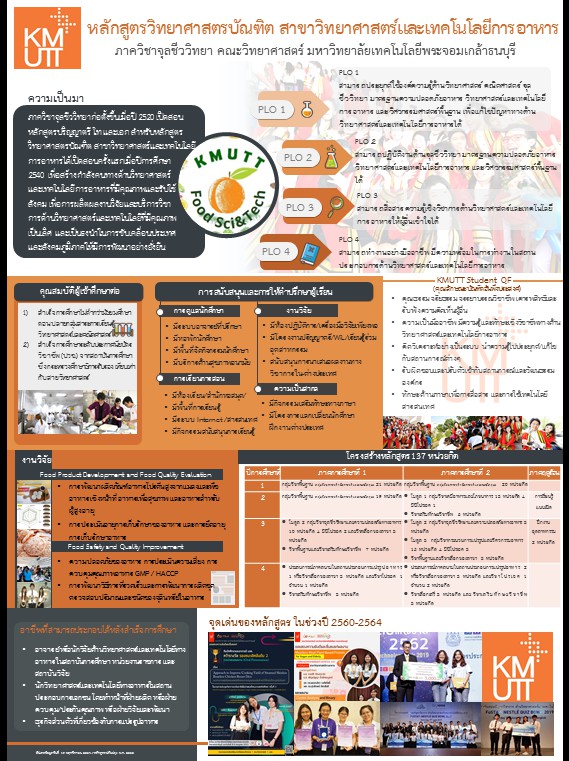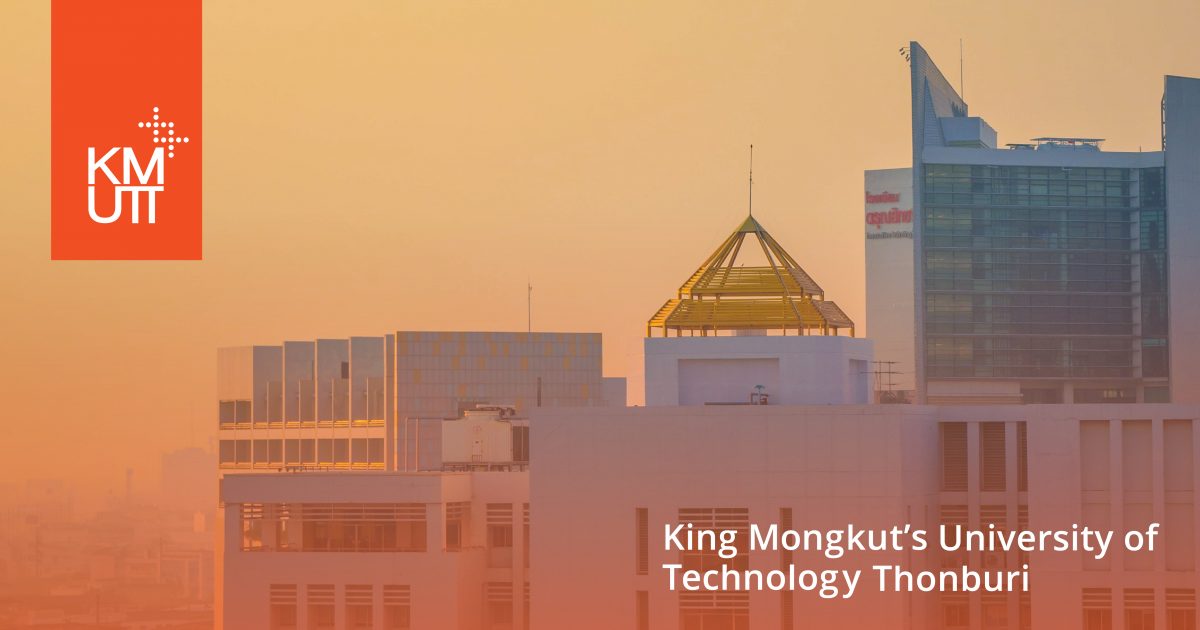หลักสูตรวิทยาศาสตร์บัณฑิต สาขาวิทยาศาสตร์และเทคโนโลยีการอาหาร
ความเป็นมา
ภาควิชาจุลชีววิทยาก่อตั้งขึ้นเมื่อปี 2520 เปิดสอนหลักสูตรปริญญาตรี โท และเอก สำหรับหลักสูตรวิทยาศาสตร์บัณฑิต สาขาวิทยาศาสตร์และเทคโนโลยีการอาหารได้เปิดสอนครั้งแรกเมื่อปีการศึกษา 2540 เพื่อสร้างกำลังคนทางด้านวิทยาศาสตร์และเทคโนโลยีการอาหารที่มีคุณภาพและรับใช้สังคม เพื่อการผลิตผลงานวิจัยและบริการวิชาการด้านวิทยาศาสตร์และเทคโนโลยีที่มีคุณภาพเป็นเลิศ และเป็นธงนำในการขับเคลื่อนประเทศและสังคมภูมิภาคให้มีการพัฒนาอย่างยั่งยืน
วัตถุประสงค์ของหลักสูตร
1. สามารถประยุกต์ใช้องค์ความรู้ด้านวิทยาศาสตร์ คณิตศาสตร์ จุลชีววิทยา มาตรฐานความปลอดภัยอาหาร วิทยาศาสตร์และเทคโนโลยีการอาหาร และ วิศวกรรมศาสตร์พื้นฐาน เพื่อแก้ไขปัญหาทางด้านวิทยาศาสตร์และเทคโนโลยีการอาหารได้
2. สามารถปฎิบัติงานด้านจุลชีววิทยา มาตรฐานความปลอดภัยอาหารวิทยาศาสตร์และเทคโนโลยีการอาหาร และ วิศวกรรมศาสตร์พื้นฐานได้
3. สามารถสื่อสาร ความรู้เชิงวิชาการด้านวิทยาศาสตร์และเทคโนโลยีการอาหารให้ผู้อื่นเข้าใจได้
4. สามารถทำงานอย่างมืออาชีพมีความพร้อมในการทำงานในสถานประกอบการด้านวิทยาศาสตร์และเทคโนโลยีการอาหาร
2. สามารถปฎิบัติงานด้านจุลชีววิทยา มาตรฐานความปลอดภัยอาหารวิทยาศาสตร์และเทคโนโลยีการอาหาร และ วิศวกรรมศาสตร์พื้นฐานได้
3. สามารถสื่อสาร ความรู้เชิงวิชาการด้านวิทยาศาสตร์และเทคโนโลยีการอาหารให้ผู้อื่นเข้าใจได้
4. สามารถทำงานอย่างมืออาชีพมีความพร้อมในการทำงานในสถานประกอบการด้านวิทยาศาสตร์และเทคโนโลยีการอาหาร
อาชีพที่สามารถประกอบได้หลังสำเร็จการศึกษา
- อาจารย์หรือนักวิจัยด้านวิทยาศาสตร์และเทคโนโลยีทางอาหารในสถาบันการศึกษา หน่วยงานราชการ และ สถาบันวิจัย
- นักวิทยาศาสตร์และเทคโนโลยีทางอาหารในสถานประกอบการเอกชน โดยทำหน้าที่ฝ่ายผลิต หรือฝ่ายควบคุม/ประกันคุณภาพ หรือฝ่ายวิจัยและพัฒนา
- ธุรกิจส่วนตัวที่เกี่ยวข้องกับการแปรรูปอาหาร
Bachelor of Science, Majoring in Food Science and Technology
Background
The Department of Microbiology was established in 1977 and offered bachelor's, master's and doctoral programs. The Food Science and Technology major was first offered in 1997 to produce capable graduates that could contribute to society. The major’s objective is to provide high-quality research and academy services in the fields of food science and technology. Additionally, it is aimed to serve as a leading flagship driving regional and nation-wide sustainable development.
Course objectives
1. Graduates are able to apply knowledge in science, mathematics, microbiology, food safety, food science and technology and fundamental engineering to solve problems in food science and technology
2. Graduates are able to competently work in the fields of microbiology, food safety, food science and technology and fundamental engineering
3. Graduates develop science communication skills to be able to competently communicate scientific ideas and messages in fields of food science and technology
4. Graduates develop work ethics (professionalism) and are able to work in fields of food science and technology
2. Graduates are able to competently work in the fields of microbiology, food safety, food science and technology and fundamental engineering
3. Graduates develop science communication skills to be able to competently communicate scientific ideas and messages in fields of food science and technology
4. Graduates develop work ethics (professionalism) and are able to work in fields of food science and technology
Careers after graduation
- A professor or researcher in food science and technology in educational institutions, government agencies and research institutes
- Food scientists in private businesses in roles such as production, quality assurance, or research and development
- Entrepreneur in food businesses, food product development, or related fields



